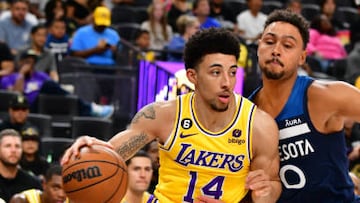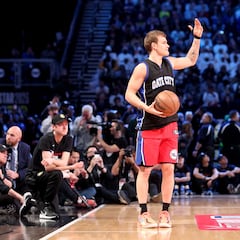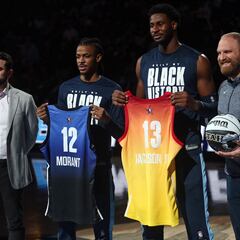What is the two-way contract in the NBA?
The league introduced two-way contracts in 2017 as a means of helping undrafted players secure deals with NBA teams.

At the start of the 2017-18 season, the NBA introduced two-contracts, which allows a player to sign a guaranteed deal with an NBA franchise and play for both its NBA professional team and its G-League affiliate. For example, if a player signs a two-way deal with the Chicago Bulls, he will be able to play for Chicago’s G-League team, the Windy City Bulls.
NBA two-ways contracts explained
The two-way contract was introduced to benefit un-drafted players who do not make the cut in the NBA Draft and enables teams to keep these players “on retainer” without having to sign to a full-time contract. Players drafted during the first or second-round of an NBA draft are also often signed to two-way contracts. Two-way players are often considered to be the “16th and 17th men” on a roster. Each NBA team is allowed to offer two two-way contracts per season to players with fewer than four years of NBA experience.
Who took all those jobs?
— Bobby Marks (@BobbyMarks42) October 15, 2022
48 players selected in the 2022 NBA Draft are on a roster.
An additional 34 players signed Two Way contracts that were not in the league last year. https://t.co/W2nvwhXUbe
Several players have signed two-way deals in the last couple of years, including Ohio State guard Duane Washington Jr., who signed a two-way contract with the Indiana Pacers after going unselected in the 2021 Draft, and Austin Reaves and Joel Ayayi, who both signed with the LA Lakers and played with the South Bay Lakers. This season the Lakers have brought in Scotty Pippen Jr. as one of their two allocations (see below for full list).
The Portland Trail Blazers are converting center Olivier Sarr to a two-way contract, source tells ESPN. Sarr played 22 games for OKC as a rookie after college stops at Wake Forest and Kentucky.
— Adrian Wojnarowski (@wojespn) October 13, 2022
Two-way contract rule changes
Two-way players were originally permitted to spend 45 days per season with their NBA team but were ineligible to play in the playoffs. However as a result of the pandemic, the league permitted two-way players to become eligible for the 2020 NBA Playoffs.
From the 2020-21 season, the amount of time a two-way player could play with his NBA team was increased to 50 games, while the minimum salary for two-way contracts increased from an initial $81,955 minimum to an overall salary worth up to $449,155.
For the 2021-22 season, the NBA Board of Governors also approved changes to roster-related rules regarding the use of two-way players during the regular season.
As per that NBA communique: “For the 2021-22 season, each two-way player will be paid a flat salary equal to 50% of the minimum player salary applicable to a player with zero years of service. A player under a two-way contract will be permitted to be on the NBA team’s active list for no more than 50 games during the regular season, with no limit on practices, workouts or other activities with the NBA team.
“In addition, there will be no deadline for signing two-way contracts with respect to the 2021-22 season, a change from the rule in the Collective Bargaining Agreement that prohibits teams from signing a player to a two-way contract after Jan. 15 of any season.”
Which NBA players are on two-way deals in 2022/23?
For the 2022/23 season, here are the two-way players (* in first of two years):
Atlanta Hawks
Trent Forrest, G
Jarrett Culver, G
Boston Celtics
JD Davison, G
Mfiondu Kabengele, C
Brooklyn Nets
Alondes Williams, G
David Duke, G
Charlotte Hornets
Bryce McGowens, G
Theo Maledon, G
Chicago Bulls
Malcolm Hill, F
Kostas Antetokounmpo, F
Cleveland Cavaliers
Isaiah Mobley, F
Mamadi Diakite, F/C
Dallas Mavericks
Tyler Dorsey, G
McKinley Wright IV, G
Denver Nuggets
Collin Gillespie, G
Jack White, F
Detroit Pistons
Braxton Key, F
Buddy Boeheim, G
Golden State Warriors
Ty Jerome, G
Anthony Lamb, G/F
Houston Rockets
Trevor Hudgins, G
Darius Days, F
Indiana Pacers
Kendall Brown, F
Trevelin Queen, G
Los Angeles Clippers
Moussa Diabate, F
Moses Brown, C
Los Angeles Lakers
Scotty Pippen Jr., G
Cole Swider, F *
Memphis Grizzlies
Kenneth Lofton Jr., F
Vince Williams Jr., F *
Miami Heat
Jamal Cain, F
Dru Smith, G
Milwaukee Bucks
Sandro Mamukelashvili, F/C
AJ Green, G
Minnesota Timberwolves
Eric Paschall, F
Luka Garza, F
New Orleans Pelicans
Dereon Seabron, G
E.J. Liddell, F *
New York Knicks
Feron Hunt, F
Trevor Keels, G
Oklahoma City Thunder
Lindy Waters III, G
Eugene Omoruyi, F
Orlando Magic
Admiral Schofield, F
Kevon Harris, G *
Philadelphia 76ers
Julian Champagnie, G/F
Michael Foster Jr., F
Phoenix Suns
Duane Washington Jr., G
Ish Wainright, F
Portland Trail Blazers
Olivier Sarr, C
John Butler, C (reported)
Sacramento Kings
Keon Ellis, G
Neemias Queta, C
San Antonio Spurs
Dominick Barlow, F
Jordan Hall, G/F *
Toronto Raptors
Ron Harper Jr., G/F
Jeff Dowtin, G
Utah Jazz
Johnny Juzang, G/F
Micah Potter, C *
Washington Wizards
Jordan Schakel, G
Related stories

Mac McClung and that Gate City jersey

The story behind the NBA All Star jerseys
Jordan Goodwin, G
(h/t hoopsrumors)